Psychological Denial
A Psychological Defense and Maladaptive Coping Mechanism In Scam Victims
Principal Category: Coping Mechanisms
Authors:
• Vianey Gonzalez B.Sc(Psych) – Licensed Psychologist, Specialty in Crime Victim Trauma Therapy, Neuropsychologist, Certified Deception Professional, Psychology Advisory Panel & Director of the Society of Citizens Against Relationship Scams Inc.
• Tim McGuinness, Ph.D. – Anthropologist, Scientist, Polymath, Director of the Society of Citizens Against Relationship Scams Inc.
This article examines and introduces the concepts of the psychological phenomenon of denial among scam victims, exploring its various forms and underlying reasons. Denial, a defense and coping mechanism shields individuals from the emotional distress of realizing they have been deceived, often manifested in forms like outright refusal to acknowledge the scam, minimizing its impact, rationalizing the scammer’s behavior, or projecting blame. Common after scams due to the emotional manipulation victims endure, denial offers temporary relief but impedes long-term recovery by blocking acknowledgment of vulnerability and the extent of losses. Factors such as fear of judgment, cognitive dissonance, and the hope for restitution contribute to its persistence. Overcoming denial is necessary for victims to seek support, process trauma, and regain control, highlighting the importance of education, empathetic support, and professional intervention in facilitating recovery and resilience post-scam.

Scam Victims and Psychological Denial: Understanding and Addressing the Aftermath of Scams and Fraud
Introduction to Scam Victim Denial
This article explores and provides an overview of the nature of denial following a scam, its different manifestations, and the reasons why nearly half of scam victims exhibit some form of this response. It also explores how to overcome it.
What is Denial?
Denial is a psychological defense mechanism where an individual refuses to accept the reality of a distressing situation, blocking external events from their awareness.
This refusal to acknowledge facts can help the person avoid emotional pain temporarily, though increases trauma afterward.
Denial can be a coping mechanism, helping individuals manage immediate stress or trauma, but it is maladaptive if it persists, as it prevents addressing underlying issues. While it is not classified as a cognitive bias or a formal mental disorder, denial can be a feature of various psychological conditions, such as substance abuse, scam addiction, or grief.
Denial After the Scam
During the scam or fraud victims often succumb to denial resulting from the psychological manipulation imposed on them by the criminals, however after the crime ends, denial can be equally pronounced.
Scam victims often fall into denial after a scam ends as a coping mechanism to protect themselves from the intense emotional pain and shame associated with the experience. Acknowledging that they were deceived can be profoundly distressing and damaging to their self-esteem and perception of their autonomy. Denial serves as a temporary shield, allowing them to avoid confronting the reality of their vulnerability and the significant financial or emotional losses they have incurred. This psychological defense helps manage immediate stress but can stop or significantly hinder long-term recovery and management of the trauma.
Scam Victims and Psychological Denial
The discovery that one has been scammed is a profoundly distressing experience, often leading to a range of psychological responses. Among these, denial stands out as a common yet complex reaction. Denial, as a defense mechanism, can take various forms and serves to protect the victim’s psyche from the immediate shock and pain of betrayal and loss.
The Nature of Denial
Denial is a psychological defense and coping mechanism where an individual refuses to accept the reality of a distressing or threatening situation. In the context of scam victims, denial functions as a buffer against the emotional impact of realizing they have been deceived and defrauded. This can be particularly intense given that scams often exploit personal vulnerabilities and trust, leading to significant financial, emotional, and psychological damage.
Forms of Denial Among Scam Victims
Denial among scam victims can manifest in various forms, each serving to temporarily shield them from the painful reality of their situation. These forms include:
Outright Denial: The victim refuses to acknowledge that they have been scammed, insisting that the transaction or relationship was legitimate. This form of denial is often rooted in the hope that the scammer will fulfill their promises.
Minimization: The victim acknowledges the scam but downplays its significance or impact. They might convince themselves that the financial loss is not substantial or that they can easily recover from it.
Rationalization: Victims create justifications for their actions and the scammer’s behavior. They may believe that their decisions were logical given the circumstances or that the scammer had some legitimate intentions.
Projection: Instead of accepting their own vulnerability, victims may project blame onto others, such as family members, friends, or institutions that they believe should have protected them.
Avoidance/Resistance: Some victims avoid thinking or talking about the scam altogether, engaging in behaviors or activities that distract them from the painful reality.
Why Almost Half of Scam Victims Exhibit Denial
Several psychological and situational factors contribute to the prevalence of denial among scam victims:
Emotional Protection: Admitting to being scammed can be emotionally devastating. Denial helps protect the victim’s self-esteem and identity by allowing them to maintain a sense of control and normalcy.
Social Stigma: There is a significant social stigma attached to being scammed, often perceived as a sign of gullibility, naivete, stupidity, foolishness, or incompetence. Denial helps victims avoid this negative judgment from themselves and others. Of course, these are not true, it was not the victim’s fault, but that fear of judgment persists.
Cognitive Dissonance: Scam victims experience cognitive dissonance when their belief in their ability to make sound decisions conflicts with the reality of having been deceived. Denial helps reduce this dissonance by maintaining their self-image.
Hope for Recovery: In cases where the scam involves promises of future returns or benefits, victims might cling to the hope that the scammer will eventually come through, perpetuating a state of denial.
Psychological Manipulation: Scammers often use sophisticated psychological tactics to manipulate and control their victims, creating a deeply entrenched belief in the legitimacy of the scam. This manipulation can be so powerful that even when faced with evidence, victims remain in denial.
Denial as a Coping Mechanism
Denial is a defense mechanism where individuals refuse to accept reality or facts, thereby protecting themselves from experiencing the full impact of a distressing situation. It is a natural, often subconscious, response that helps to shield the mind from emotional pain and psychological stress.
Denial functions also as a coping mechanism by temporarily protecting an individual from the immediate emotional impact of a distressing or threatening reality.
When faced with the harsh truth of being scammed, victims often experience intense feelings of shame, guilt, and self-recrimination. Denial helps shield them from these overwhelming emotions by allowing them to maintain a sense of normalcy and control, at least in the short term.
The Psychology of Denial
Denial operates by temporarily blocking out information that is too painful to acknowledge. This allows individuals to avoid feelings of anxiety, fear, and helplessness. While it can provide short-term relief, prolonged denial can prevent individuals from addressing and resolving underlying issues.
How Denial Functions
Emotional Buffer: When faced with traumatic events, such as being scammed, denial acts as an emotional buffer. By refusing to accept the reality of the situation, the victim can momentarily protect themselves from the overwhelming emotions that come with the realization of being deceived.
Avoidance of Cognitive Dissonance: Cognitive dissonance occurs when there is a conflict between beliefs and reality. Denial helps to minimize this dissonance by allowing individuals to cling to their pre-existing beliefs, even in the face of contradictory evidence – such as ‘the relationship is/was real’.
Maintaining Self-Image: Accepting that one has been scammed can severely damage self-esteem and self-image. Denial helps maintain a positive self-view by preventing the acknowledgment of being vulnerable or gullible. This can manifest as pride.
Stages of Denial
Denial can manifest in various stages:
Shock and Disbelief: Immediately after realizing they have been scammed, victims might deny the occurrence of the scam altogether, convincing themselves it’s a mistake or misunderstanding.
Minimization: Victims might acknowledge the scam but minimize its impact, believing it wasn’t as severe or costly as it actually was.
Rationalization: They might create rational explanations for the scammer’s behavior, thinking the scammer had legitimate reasons or that their intentions were misunderstood.
Projection: Victims might project blame onto others, such as family members or even themselves, to avoid facing the reality of the scam.
Why Denial Occurs in Scam Victims
Emotional Attachment: Scammers often build strong emotional connections with their victims. Breaking these bonds is painful, and denial helps avoid this emotional trauma.
Fear of Judgment: Victims fear being judged or ridiculed by others for falling for the scam. Denial protects against this potential social stigma.
Psychological Dependence: During the scam, victims may develop a psychological and hormonal/neurotransmitter dependence on the scammer (an addiction.) Denial helps maintain the illusion of the relationship and the associated emotional highs that can come (for a while) from the release of hormones and neurotransmitters.
Why Denial Occurs in Scam Victims
Emotional Overload: Confronting the reality of being scammed can be emotionally overwhelming. Denial acts as a buffer, giving the victim time to process the event gradually.
Self-Protection: Admitting to being scammed can be damaging to one’s self-esteem and identity. Denial helps preserve a positive self-image by deflecting blame and maintaining a sense of competence.
Avoidance of Cognitive Dissonance: As we said previously, cognitive dissonance occurs when there is a conflict between one’s beliefs and reality. Denial reduces this dissonance by aligning perceptions with pre-existing beliefs, thus maintaining psychological comfort.
Hope and Optimism: Victims often cling to (false) hope that the relationship is real, the investment is real, the scam is not real, and that the scammer will eventually fulfill their promises. This hopeful thinking (toxic positiveness or optimism) can prolong denial, as it offers an escape from immediate despair.
The Brain’s Role in Denial
Denial engages several key brain regions involved in emotional regulation, cognitive processing, and decision-making:
Amygdala: The amygdala is central to the processing of emotions, particularly fear and stress, but also positive emotions such as love. When a scam victim is confronted with the reality of their situation, the amygdala triggers a stress response. Denial helps mitigate this stress by downplaying the perceived threat.
Prefrontal Cortex: This area is responsible for higher-order cognitive functions such as reasoning, planning, and impulse control. In denial, the prefrontal cortex helps rationalize the situation to reduce cognitive dissonance, allowing the victim to maintain their current beliefs and avoid the distressing reality.
Anterior Cingulate Cortex (ACC): The ACC plays a role in error detection and emotional regulation. When the ACC detects a mismatch between beliefs and reality, it can induce feelings of discomfort. Denial helps to minimize this discomfort by ignoring or rejecting the conflicting information.
Hippocampus: Involved in memory formation, the hippocampus helps integrate past experiences with current events. In denial, the hippocampus may selectively recall information that supports the victim’s current belief system, thus reinforcing the denial.
Denial in Scam Victims: A Neurochemical Perspective
Scam victims often experience initial denial after the scam ends, a reaction that may be deeply connected to the neurochemical changes in their brains during the scam. The manipulation and control techniques employed by scammers can lead to a form of hormonal and neurotransmitter addiction, resulting from repeated amygdala hijacking and emotional manipulation.
Neurochemical Changes During the Scam
Amygdala Hijacking: Scammers frequently manipulate victims’ emotions, causing repeated amygdala hijacks – also known as love bombing. Over time, this leads to heightened emotional responses and dependency on these hormones and neurotransmitters.
Dopamine Addiction: Scammers often create a cycle of intermittent rewards and punishments, akin to gambling. Positive interactions and promises of rewards release dopamine, the brain’s “feel-good” neurotransmitter, creating a sense of pleasure and reinforcing the victim’s attachment to the scammer.
Oxytocin and Bonding: Through emotional manipulation, scammers can foster feelings of trust and intimacy in victims, increasing oxytocin levels. This hormone, associated with bonding and social connections, can deepen the victim’s emotional investment in the scammer.
Withdrawal and Denial
Hormonal & Neurotransmitter Withdrawal: Once the scam ends, victims experience a sudden drop in these neurochemicals. The absence of the previously frequent highs (dopamine) and the stress-induced adrenal activity can lead to a state of withdrawal, similar to what is seen in substance addiction. This biochemical imbalance contributes to feelings of emptiness, confusion, and distress.
Cognitive Dissonance: The brain struggles to reconcile the reality of being scammed with the emotional bonds and trust that were formed. Denial helps bridge this gap, allowing the victim to temporarily avoid the painful truth and maintain a semblance of emotional stability.
Stress Hormone Rebound: The abrupt end of scam-related stress can cause a rebound effect, where the brain, now deprived of its usual stress hormone levels, experiences heightened anxiety and vulnerability. Denial acts as a protective mechanism, minimizing additional stress and emotional overload.
Denial in scam victims post-scam is not merely a psychological defense but also a neurochemical response to the withdrawal from the hormonal and neurotransmitter addiction developed during the scam. Understanding this connection can help in developing targeted support and interventions to assist scam victims in overcoming denial and beginning their recovery process
Denial’s Role in Hindering Recovery for Scam Victims
Denial can significantly hinder a scam victim’s recovery process.
It prevents them from taking necessary steps to address the scam, seek help, and implement measures to prevent future scams. Overcoming denial is crucial for healing and regaining control over their lives.
It is most pronounced in money mules, where victims are simply unable to stop the scam and acknowledge reality.
While offering temporary emotional relief, psychological denial can significantly impede a scam victim’s ability to recover both psychologically and emotionally. By refusing to accept the reality of their victimization, individuals inadvertently create barriers to seeking the necessary support and professional help.
Inhibiting the Seeking of Support
Emotional Avoidance: Denial helps scam victims avoid the intense emotional pain associated with acknowledging their victimization. However, this avoidance also means they are less likely to seek support from friends, family, support providers, or mental healthcare professionals which are required for emotional recovery.
Fear of Stigma: Victims often fear being judged or ridiculed for falling for a scam. Denial serves as a protective barrier, preventing them from admitting the scam to others and, consequently, seeking the support and understanding they need.
Blocking Professional Help
Refusal to Accept Reality: Denial can keep victims in a state of disbelief, where they refuse to accept that they have been scammed. This refusal often extends to resisting professional help, as acknowledging the need for therapy or counseling means confronting the painful truth.
Underestimating the Impact: By minimizing the severity of the scam, many victims convince themselves that professional help is unnecessary. This underestimation prevents them from accessing therapeutic interventions that are essential to their recovery.
Psychological and Emotional Impediments
Stagnation in Healing: Denial stalls the healing process. Victims remain stuck in a loop of avoidance, preventing themselves from processing their trauma and moving forward. This stagnation can lead to prolonged emotional distress and a sense of hopelessness.
Increased Vulnerability: Without confronting their experience, victims remain vulnerable to future scams. Denial prevents them from learning from their experience and implementing measures to protect themselves in the future.
Overcoming Denial for Recovery
Recognition and Acknowledgment: The first step in overcoming denial is recognizing and acknowledging its presence. Victims need to understand that denial is a natural response but one that ultimately hinders their recovery.
Seeking Support Networks: Engaging with support networks, whether through friends, family, or specialized support providers, can provide victims with the reassurance and validation needed to confront their experience.
Professional Intervention: Therapists and counselors can help victims work through denial, offering strategies to gradually accept reality and begin the healing process.
Educational Empowerment: Educating victims about the nature of scams and their psychological impact can empower them to break through denial. Understanding that they are not alone and that many people experience similar reactions can reduce feelings of isolation and shame.
Denial serves as a temporary shield against the harsh reality of being scammed but ultimately hinders recovery. By preventing the seeking of support and professional help, denial keeps victims trapped in a cycle of avoidance and emotional distress. Overcoming denial is essential for psychological and emotional healing, allowing victims to reclaim their sense of control and resilience. Recognizing denial, seeking support, and engaging in professional intervention are crucial steps toward recovery and protection against future scams.
Overcoming Denial in Scam Victims
Overcoming denial is a critical step in the recovery process for scam victims. Here are some strategies to help victims move past denial:
Education and Awareness: Learning about common scam tactics and psychological effects and manipulation can help victims understand that their experience is not unique and that they are not alone.
Support Providers (SCARS): Engaging with others who have had similar experiences can provide a safe space for victims to share their stories and begin to accept the reality of their situation.
Therapeutic Interventions: Professional therapy, particularly cognitive-behavioral therapy (CBT), can help victims process their emotions, challenge their denial, and develop healthier coping mechanisms.
Validation and Empathy: Offering validation and empathy can help victims feel understood and supported, reducing their need to maintain denial as a defense mechanism.
Gradual Exposure: Gradually exposing victims to the reality of their situation in a controlled and supportive manner can help them process their emotions without becoming overwhelmed.
Remember
Denial serves as a crucial psychological defense and coping mechanism for scam victims, temporarily shielding them from the full emotional impact of their experience. The brain plays an active role in facilitating denial, engaging regions responsible for emotion, memory, and cognitive processing to create a narrative that minimizes distress. Understanding the mechanisms of denial can help in developing strategies to support scam victims in confronting and overcoming their experience, leading to healthier recovery and resilience.
Denial is a common and natural response for many scam victims, serving as a temporary shield against the immediate pain and shock of being deceived. However, it is very important for recovery that victims eventually confront and accept their reality. By understanding the various forms of denial and the reasons behind them, support systems can better assist victims in moving past this defense mechanism, enabling them to heal and rebuild their lives. Recognizing and addressing denial is a key step in the journey towards recovery and resilience for scam victims.
IMPORTANT NOTE: This article is intended to be an introductory overview of complex psychological, neurological, physiological, or other concepts, written primarily to help victims of crime understand the wide-ranging actual or potential effects of psychological trauma they may be experiencing. The goal is to provide clarity and validation for the confusing and often overwhelming symptoms that can follow a traumatic event. It is critical to understand that this content is for informational purposes only and does not constitute or is not a substitute for professional medical advice, diagnosis, or treatment. If you are experiencing distress or believe you are suffering from trauma or its effects, it is essential to consult with a qualified mental health professional for personalized care and support.

Welcome to the SCARS INSTITUTE Journal of Scam Psychology
A Journal of Applied Scam, Fraud, and Cybercrime Psychology – and Allied Sciences
A dedicated site for psychology, victimology, criminology, applied sociology and anthropology, and allied sciences, published by the SCARS INSTITUTE™ – Society of Citizens Against Relationship Scams Inc.
TABLE OF CONTENTS
A Question of Trust
At the SCARS Institute, we invite you to do your own research on the topics we speak about and publish, Our team investigates the subject being discussed, especially when it comes to understanding the scam victims-survivors experience. You can do Google searches but in many cases, you will have to wade through scientific papers and studies. However, remember that biases and perspectives matter and influence the outcome. Regardless, we encourage you to explore these topics as thoroughly as you can for your own awareness.
Please Leave A Comment
Recent Comments
On Other Articles
[better_recent_comments number=”5″ format=”{avatar} on {post}: “{comment}” {date}” avatar_size=”20″]
A Note About Labeling!
We often use the term ‘scam victim’ in our articles, but this is a convenience to help those searching for information in search engines like Google. It is just a convenience and has no deeper meaning. If you have come through such an experience, YOU are a Survivor! It was not your fault. You are not alone! Axios!
Statement About Victim Blaming
Some of our articles discuss various aspects of victims. This is both about better understanding victims (the science of victimology) and their behaviors and psychology. This helps us to educate victims/survivors about why these crimes happened and to not blame themselves, better develop recovery programs, and to help victims avoid scams in the future. At times this may sound like blaming the victim, but it does not blame scam victims, we are simply explaining the hows and whys of the experience victims have.
These articles, about the Psychology of Scams or Victim Psychology – meaning that all humans have psychological or cognitive characteristics in common that can either be exploited or work against us – help us all to understand the unique challenges victims face before, during, and after scams, fraud, or cybercrimes. These sometimes talk about some of the vulnerabilities the scammers exploit. Victims rarely have control of them or are even aware of them, until something like a scam happens and then they can learn how their mind works and how to overcome these mechanisms.
Articles like these help victims and others understand these processes and how to help prevent them from being exploited again or to help them recover more easily by understanding their post-scam behaviors. Learn more about the Psychology of Scams at www.ScamPsychology.org
Psychology Disclaimer:
All articles about psychology, neurology, and the human brain on this website are for information & education only
The information provided in these articles is intended for educational and self-help purposes only and should not be construed as a substitute for professional therapy or counseling.
While any self-help techniques outlined herein may be beneficial for scam victims seeking to recover from their experience and move towards recovery, it is important to consult with a qualified mental health professional before initiating any course of action. Each individual’s experience and needs are unique, and what works for one person may not be suitable for another.
Additionally, any approach may not be appropriate for individuals with certain pre-existing mental health conditions or trauma histories. It is advisable to seek guidance from a licensed therapist or counselor who can provide personalized support, guidance, and treatment tailored to your specific needs.
If you are experiencing significant distress or emotional difficulties related to a scam or other traumatic event, please consult your doctor or mental health provider for appropriate care and support.
Also, please read our SCARS Institute Statement About Professional Care for Scam Victims – here
If you are in crisis, feeling desperate, or in despair please call 988 or your local crisis hotline.
SCARS Institute Resources:
- If you are a victim of scams go to www.ScamVictimsSupport.org for real knowledge and help
- Enroll in SCARS Scam Survivor’s School now at www.SCARSeducation.org
- To report criminals visit https://reporting.AgainstScams.org – we will NEVER give your data to money recovery companies like some do!
- Sign up for our free support & recovery help by https://support.AgainstScams.org
- Follow us and Find our podcasts, webinars, and helpful videos on YouTube: https://www.youtube.com/@RomancescamsNowcom
- SCARS Institute Songs for Victim-Survivors: https://www.youtube.com/playlist…
- See SCARS Institute Scam Victim Self-Help Books at https://shop.AgainstScams.org
- Learn about the Psychology of Scams at www.ScamPsychology.org
- Dig deeper into the reality of scams, fraud, and cybercrime at www.ScamsNOW.com and www.RomanceScamsNOW.com
- Scam Survivor’s Stories: www.ScamSurvivorStories.org
- For Scam Victim Advocates visit www.ScamVictimsAdvocates.org
- See more scammer photos on www.ScammerPhotos.com


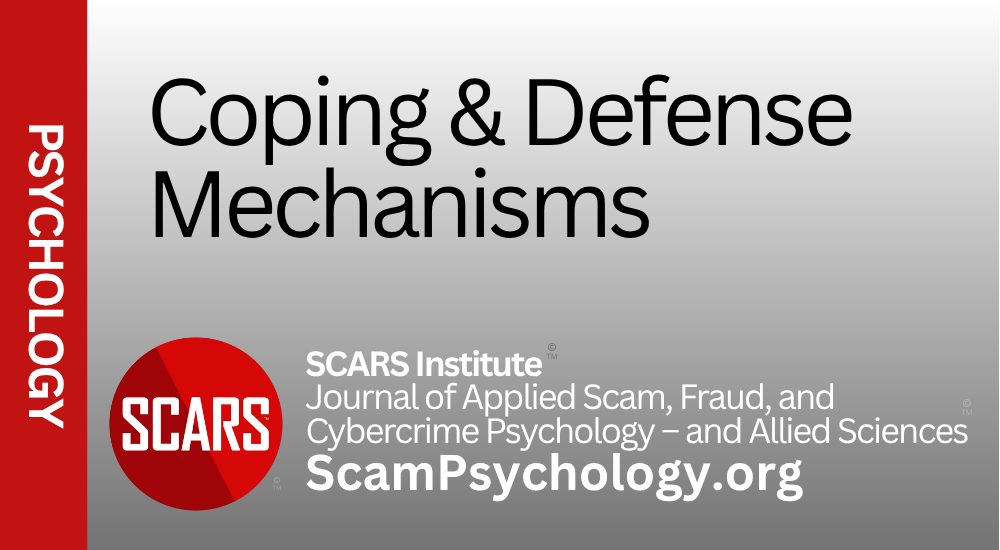
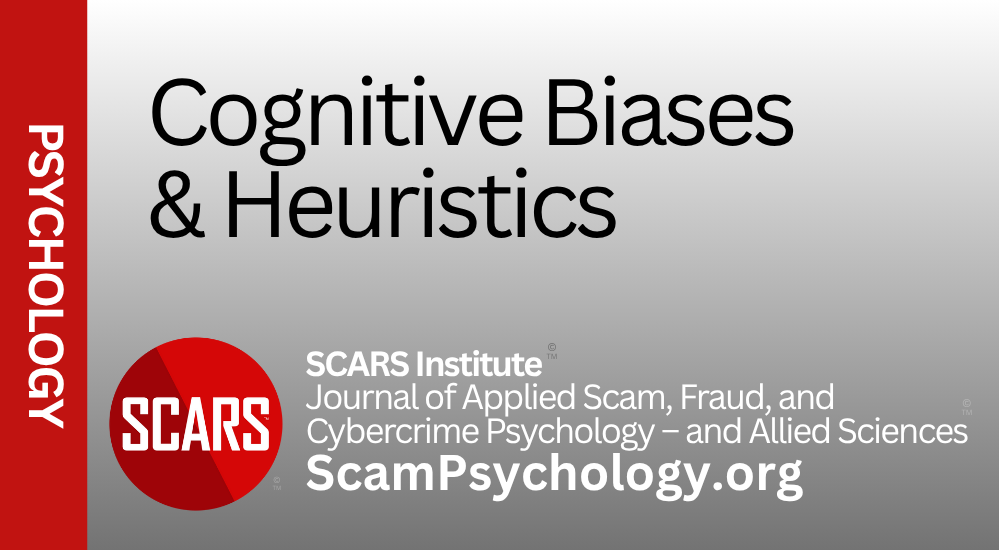
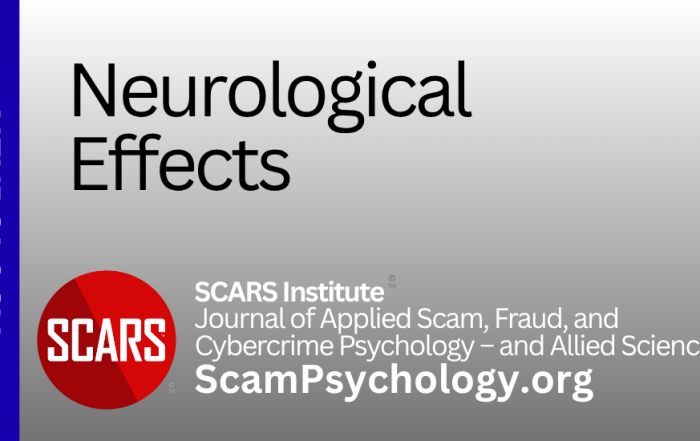

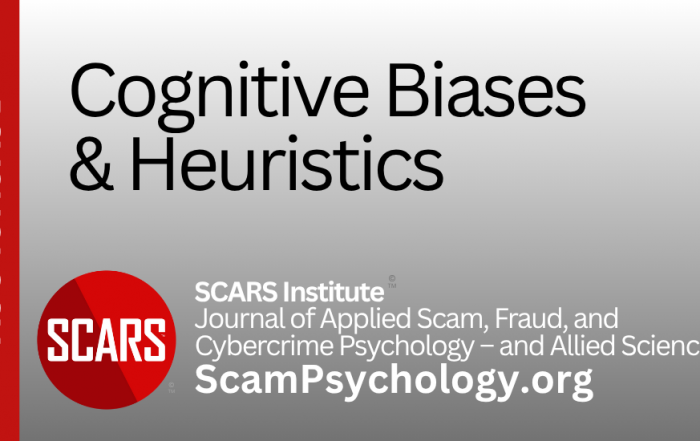
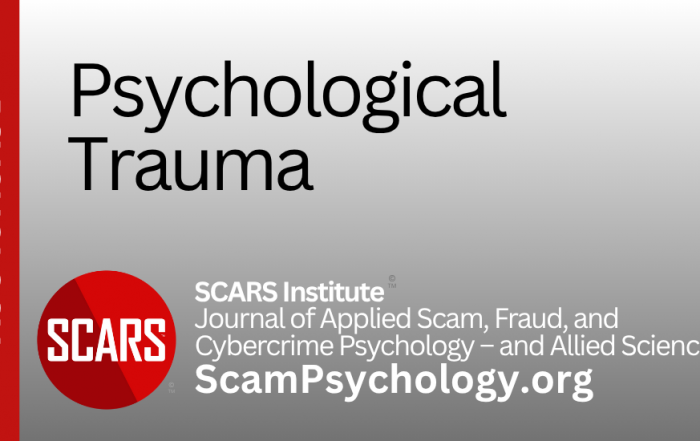
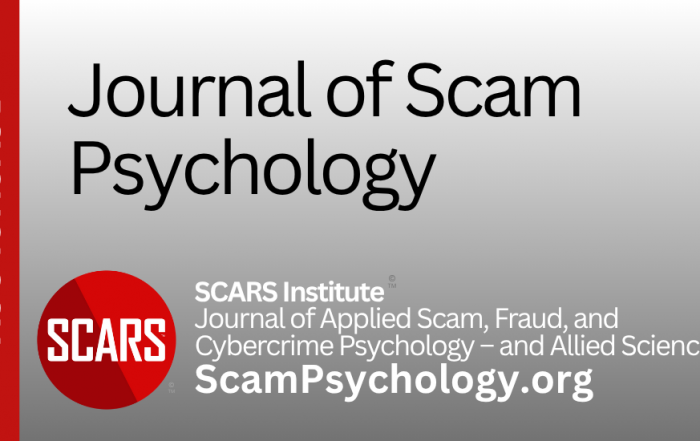
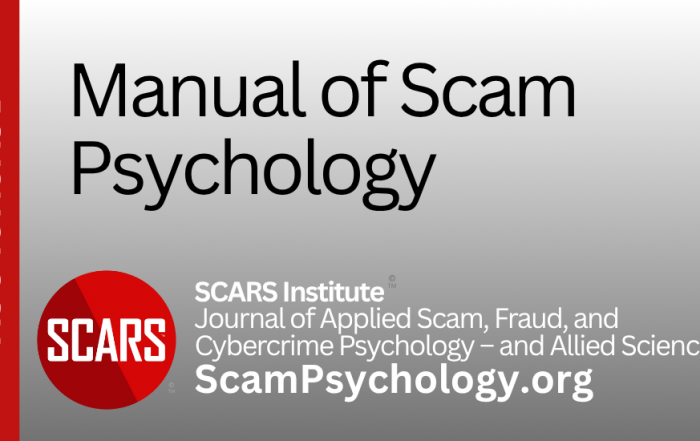

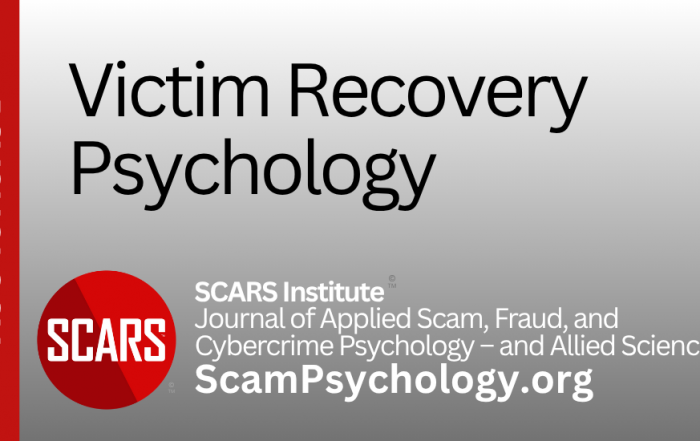


![niprc1.png1_-150×1501-11[1]](https://scampsychology.org/wp-content/uploads/2025/05/niprc1.png1_-150x1501-111.webp)
Shock and Disbelief was a big part of my initial response when I discovered I had been scammed. It lasted for months. With help from SCARS now have a much better grasp on the reality of what happened.
Learning about our responses to distressing situations like the scam from the neurochemical and psychological points of view really helps understand what we have been through and learns way to overcome our negative coping mechanisms.
I can see from this article how denial can become a coping mechanism for individuals after a scam. I myself have not taken the path of denial. I was taught growing up to always face my troubles. I started first with local law enforcement even before cutting off communication with the criminals. That followed within a week. The county sheriff who arrived and took my report pushed me hard to tell my husband and most especially tell him the dollar amount that was lost. And I did. I was terrified. Yes, it is hard to face our crimes. It is hard to push aside the shame and guilt that society insists that we have to feel; perhaps that is THEIR coping mechanism. Eventually, though we must stop living with denial and face the outcome even though it hurts so bad.